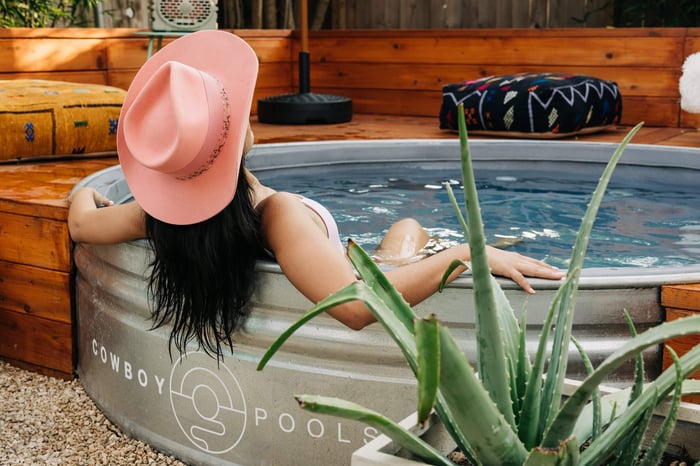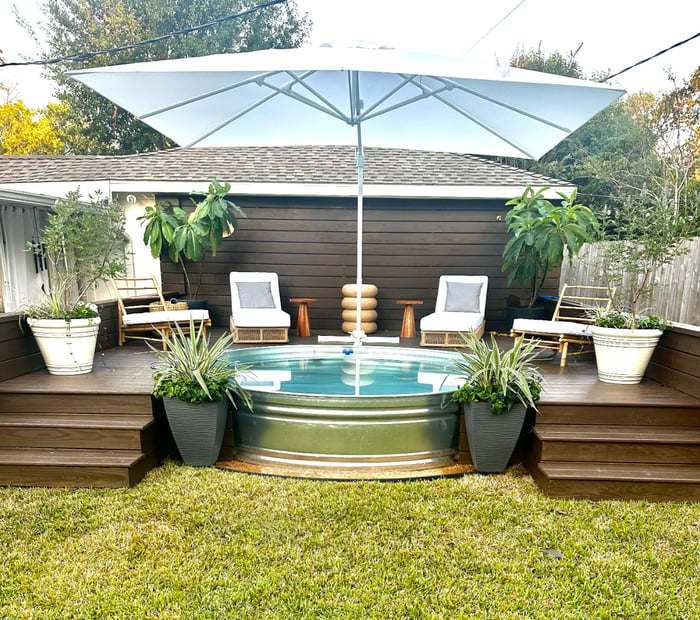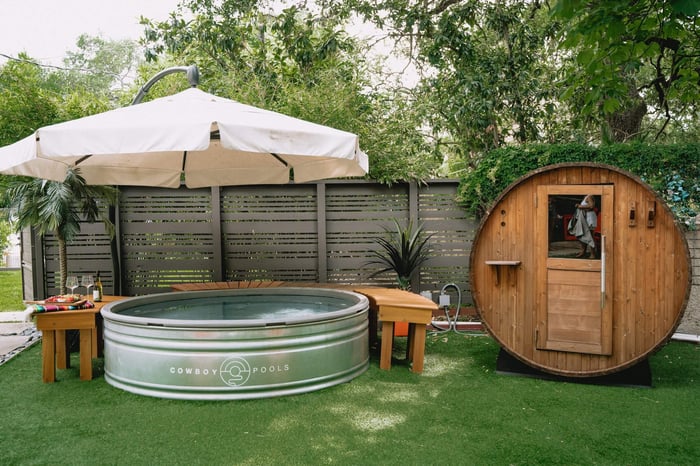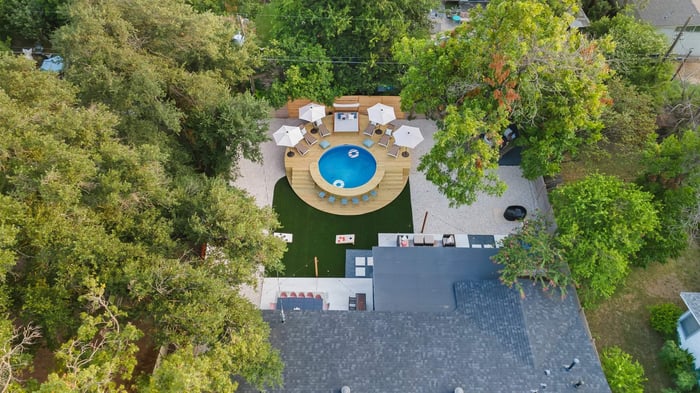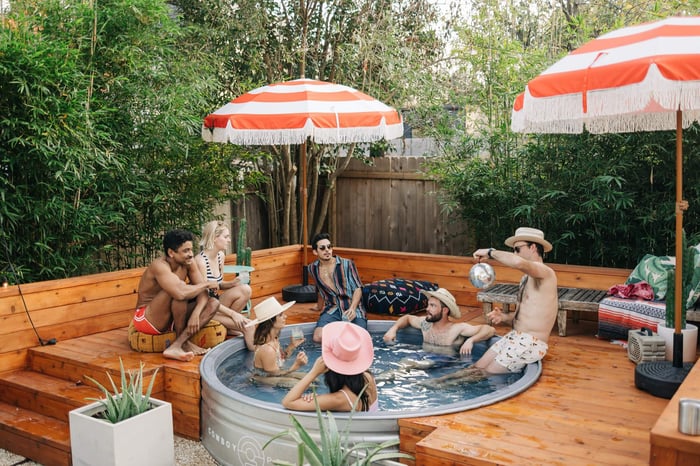
WHAT IS A PLUNGE POOL? (SIZE, COST, AND PRACTICAL OPTIONS)
Table of Contents
A plunge pool, or dipping pool, is a small, shallow pool designed for relaxation and cooling off, typically 6-12 feet wide and 2-5 feet deep. Ideal for those seeking the luxury of a pool without the cost and space of a larger one, this guide covers the benefits and why these could be a great addition to your outdoor space.
Plunge Pool Characteristics
Compact Size: Generally 6-12 feet across, ideal for small yards.
Design Flexibility: Available in various shapes or custom designs.
Ease of Maintenance: Smaller water volume makes maintenance easier and cheaper.
Year-Round Use: Can include heating systems for use in cooler months.
-
Heater & Chiller Systems

$1,950.00
Introducing our Heater & Chiller combination systems, for The All-in-One Communal Hot Tub, Cold Plunge, and Soaking PoolHeat or Chill your Cowboy Pool to your desired temperature when you purchase a combination heater and chiller system! New TempTamer: Easily control… read more
Is a Plunge Pool Right for You? (Benefits)
Plunge pools are not just a trendy backyard feature—they offer practical benefits that make them an excellent choice for many homeowners.
Space-Saving Solution
Small Backyard Friendly: Their compact size makes them suitable for small spaces and urban backyards and balconies where a traditional pool could never fit.
Aesthetic Enhancement: Despite their smaller size, these pools can transform your outdoor area.
Cost-Effective
Lower Initial Investment: The cost of installing a these pool is much less than that of a full-size pool, making it a more accessible option for many. Even with a full deck built around the the pool, the overall cost is still less than many traditional pools.
Reduced Ongoing Expenses: Plunge pools require fewer chemicals and less water, lowering the ongoing pool maintenance costs. The maintenance is also easy and straightforward so that you would not even need to hire someone.
Versatility and Functionality
Health and Wellness: They can be equipped with spa jets for hydrotherapy and relaxation, providing benefits similar to hot tubs. They also can double as cold plunges with the TempTamer heater and chiller combo unit by Cowboy Pools.
Entertainment Value: These pools are ideal for cooling off during hot days or as a focal point during gatherings, enhancing your outdoor space's social and leisure use.

How Much Does a Plunge Pool Cost?
Considering the benefits, these pools cost can offer significant value, especially compared to larger swimming pools.
Here's a breakdown of what you might expect to invest:
Installation Costs
Pool Type: In-ground pools are more expensive due to excavation; above-ground models are cheaper.
Materials & Design: Costs vary by materials (concrete, fiberglass) and design complexity.
Maintenance Costs
Water Treatment: Smaller volume means lower chemical and water costs.
Heating & Equipment: Optional heaters and pumps are less expensive than those for larger pools and require significantly less energy to heat or cool down the entire pool.
Overall Investment: Costs range from $1,000 for basic models to over $10,000 for longer lasting models with features for heating and cooling.
Exploring Types of Plunge Pools
Understanding the different kinds of pools can help you make an informed decision that best suits your space, your lifestyle and your needs.
In-ground
Durability: Built into the ground, these pools are a permanent addition to your home, adding to its value.
Customizable: They can be tailored to fit any design aesthetic, making them a versatile option for those looking to match a specific landscape or architectural style.
Above-ground
Cost-Effective: These are generally less expensive and quicker to install than in-ground pools. You'd be spending less on not only materials but also labor by not needing to hire a team to install these pools.
Flexibility: Easy to install in various locations, the pools above-ground can also be moved if necessary. From small backyards to balconies, these pools have been everywhere.
Cocktail Pools
Entertainment Focus: Larger than a typical plunge but smaller than a traditional pool, cocktail pools are designed for socializing and can include built-in seating or even a swim-up bar.
Hybrid Use: They combine the features of a hot tub and a pool, often equipped with heating elements and jets.
What's the Difference Between a Plunge Pool and a Regular Pool?
Choosing between these two different kinds of pools l involves understanding their key differences in size, maintenance, and installation costs.
Size and Usage
Plunge Pools: Generally 6 to 12 feet in diameter and about 2-5 feet deep, these pools are designed for soaking and cooling rather than swimming laps.
Regular Pools: These are much larger and designed for swimming laps and hosting larger pool parties.
Maintenance and Cost
Plunge Pools: Easier and less costly to maintain. They use less water and chemicals, making them a more sustainable option. The maintenance can also be done in five minutes or less, making it an easy to-do list item.
Regular Pools: Require more extensive maintenance, including more frequent chemical treatments and cleaning.
Installation
Plunge Pools: Quicker and typically less invasive to install, perfect for homeowners looking for a simple pool solution. Upon delivery, these pools, including Cowboy Pools can be installed in less than an hour with no tools required.
Regular Pools: Installation can be lengthy and costly, often involving substantial landscaping changes. Installation for regular in-ground pools can often last months and requires permits to dig up a backyard.
Is a Cocktail Pool the Same?
While both cocktail pools and plunge pools are smaller than traditional swimming pools, there are many distinct differences that you should know:
Cocktail Pool: These typically includes additional features, such as steps and handles, and may be slightly larger to accommodate more people.
Plunge Pool: Primarily focused on relaxation and cooling off, perfect for those with limited space who do not need the additional features of a cocktail pool.
Choose the Right Type of Pool with Cowboy Pools
Choosing the best pool for your home involves considering your available space, budget, and how you plan to use the pool. They offer a convenient and cost-effective solution for homeowners looking to enhance their outdoor spaces without the commitment of a full-size swimming pool.
Ready to find the perfect pool for your home?
Explore Cowboy Pools' range of stock tank pools, from the luxurious stock tank pool accessories to the simple and elegant plunge pools.
Dive into relaxation with a Cowboy Pool—your gateway to a refreshing backyard experience!
FAQs
Can a plunge pool be heated or cooled?
Yes! Many plunge pools, including Cowboy Pools, can be equipped with heating and cooling systems — like the TempTamer heater-chiller combo — allowing you to enjoy your pool year-round as a hot tub, cold plunge, or refreshing summer soak.
How much space do I need for a plunge pool?
Most plunge pools only require about a 7x7 to 12x12-foot area, making them ideal for small backyards, patios, and urban outdoor spaces.
Are plunge pools hard to maintain?
Nope! Their smaller water volume means easier cleaning, fewer chemicals, and lower ongoing costs. Many homeowners maintain their plunge pools themselves without the need for a pool service.



